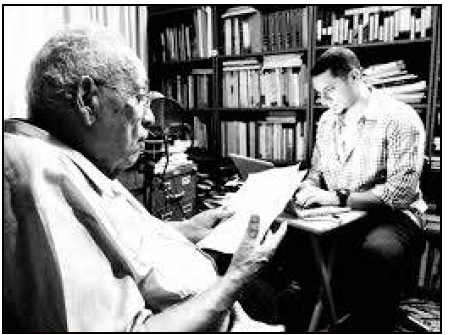“Haram” Makes a Dream Come True

For the first time in months, Dr. Hathout is back at the mic for a brand new episode of Straight Talk. This time, he sits down with filmmaker Wesam Nassar, who is also the director of “ Haram: An abstract drama based on the poetry of Maher Hathout.” When it debuted in LA two weeks ago, the play was met with sold-out audiences and appreciation for seeing another side of Dr. Hathout. A passion project for both the poet and the director, the two discuss the meaning of the story and poems that make up the play, and the play’s central message about the priceless value of self-expression through art as a vehicle for positive change.
During its sold-out run at the Odyssey Theater in Los Angeles, "Haram: An abstract drama based on the poetry of Maher Hathout" was seen by more than 300 people who gave the cast and Dr Hathout a standing ovation, night after night.
The play is a collaboration between five Los Angeles-based American Muslim artists: Dr. Hathout, Wesam Nassar, Omar Offendum, Susu Attar and Samira Idroos. Featuring a talented cast of a dozen diverse actors, the play is based on a short story written by Dr Hathout in the late 1950s and four poems he wrote in the 1950s and 1960s.
"Haram" tells the tale of the universal struggle of love and war; and the love of a couple, of a people, of an ideal world in the face of tyranny and oppression. Is it possible for love not to be soured by an eroding world?
Troubled times threaten to tear apart a young woman and man, deeply in love. As he hears the call to join the resistance and abandon his beloved, she battles for the survival of their loving home. Whatever choice they make, inevitably, they are left with "Haram," an Arabic word that has at least three important variations in its meaning: sin, an expression of protest or an expression of regret.
Dr Hathout, MPAC's co-founder and Senior Adviser, attended the Sunday show and participated in a moving Q&A session after the show.
During his remarks, he commended the young artists for putting their energy into something constructive that sheds beauty and light on Islam. He also thanked them for dedicating themselves and their talents to making his dream of bringing his poetry to an audience a reality and for creating this "historic moment" for the American Muslim community.
He encouraged Muslims to demonstrate the beauty and creativity that Islam inspires by supporting and producing art of all forms.
As he writes in one of the poems featured in the play:
As long as there is poetry.
That is pulsating with truth.
It not only gives.
It gives plenty.
Boasting of beauty, full of hope.
Strutting above the overwhelming ugliness.
Refreshing hearts and tenderizing them.
Emanating tears which shimmer.
Awakening the feelings deep inside people.
So it truly resurrects us.
It brings us back from the dead.
It brings a radical change.
Hope will be alive.
From the womb of despair, a new embryo is born.
As the flowers blossom.
Branches are moistened.
Leaves sprout.
Oh morning light that we are longing for.
We are still anxiously awaiting.
We are so desperately seeking.
We are still writing for the blind.
And sing a song for the deaf.
And knock on the door of the shut heart.
Until it opens or collapses.
If it does not open, it will collapse
Back to Pakistanlink Homepage

